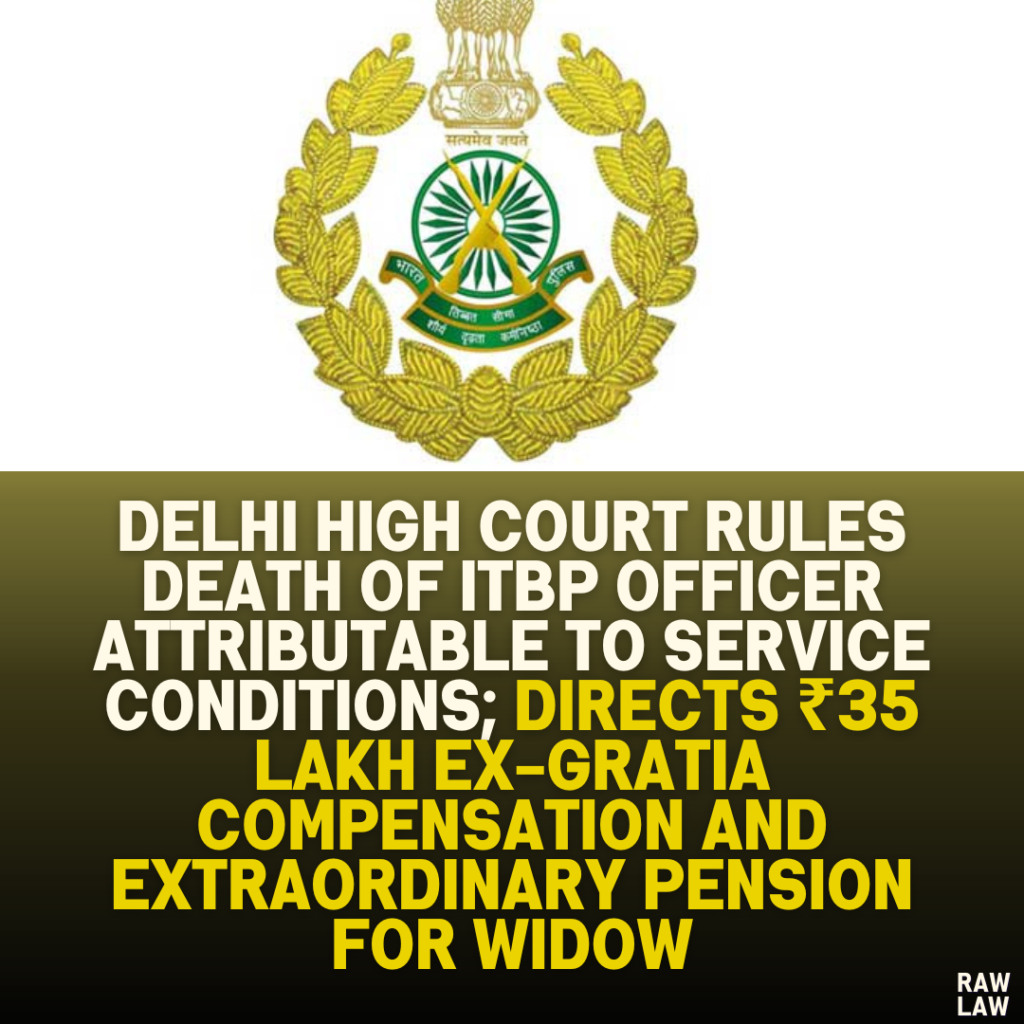1. Court’s Decision
The Delhi High Court ruled in favor of the petitioner, the widow of an ITBP officer, holding that her husband’s death was attributable to or aggravated by service conditions. The court directed the respondents to:
- Sanction an Extraordinary Pension under Rule 3-A of the CCS (Extraordinary Pension) Rules, 2005, effective from the officer’s date of death.
- Pay an ex-gratia lump sum compensation of ₹35 lakhs with 8% interest per annum, also effective from the date of the officer’s death.
- Complete these payments within 12 weeks.
The court found the respondents’ rejection of the petitioner’s claims unsatisfactory and set aside the impugned order.
2. Facts
- The petitioner’s husband served as an Inspector in the Indo-Tibetan Border Police Force (ITBP) and was posted in a Hard Area in Arunachal Pradesh at the time of his demise.
- On March 14, 2016, the officer experienced chest pain while playing badminton, which worsened and led to his death four days later on March 18, 2016. The official cause of death was “acute anterior wall myocardial infarction.”
- The officer had a history of being medically fit (classified as SHAPE-1) and was regularly posted in Extreme Hard Areas like Ladakh, Himachal Pradesh, and Jammu & Kashmir.
- The petitioner sought an Extraordinary Pension and ex-gratia compensation of ₹35 lakhs, claiming that his death was caused or aggravated by continuous exposure to harsh conditions in his service postings.
3. Issues
The court identified two key legal questions:
- Was the death attributable to or aggravated by the officer’s service conditions, making the petitioner eligible for extraordinary pension benefits?
- Was the petitioner entitled to the ex-gratia lump sum compensation of ₹35 lakhs under government rules?
4. Petitioner’s Arguments
- Service Conditions Aggravated Health: The officer’s postings in Extreme Hard Areas and exposure to challenging conditions led to his deteriorating health.
- Fitness Prior to Death: The officer had a clean medical record, and his placement in SHAPE-1 indicated no pre-existing conditions.
- Negligence in Medical Attention: The lack of adequate medical facilities and delays in transporting the officer to a suitable hospital contributed to his death.
- Entitlement to Compensation: As per Rule 3-A of the CCS (Extraordinary Pension) Rules, 2005 and the Office Memorandum dated August 4, 2016, the petitioner was entitled to extraordinary pension and ex-gratia compensation.
- Cited precedents, including:
- Dharamvir Singh v. Union of India: Health issues arising during service should be treated as attributable to service unless proven otherwise.
- Ramesh Fonia v. Union of India: Defined “active duty” to include preparatory or recreational activities, which applied to the officer’s case.
5. Respondent’s Arguments
- Natural Cause of Death: The respondents contended that the officer’s death was due to a natural cardiac condition unrelated to service.
- Eligibility Criteria Not Met: Claimed that the death did not arise from occupational hazards, extreme conditions, or hostile work environments.
- Benefits Already Paid: Stated that all applicable benefits under regular pension rules had been disbursed, including gratuity and treatment expenses.
6. Analysis of the Law
The court analyzed:
- Rule 3-A of CCS (Extraordinary Pension) Rules, 2005: Requires a direct or aggravated link between the officer’s death and service conditions.
- Category ‘B’ Deaths: Includes deaths aggravated by government service, such as exposure to hostile environments or extreme weather conditions.
- Office Memorandum Dated August 4, 2016: Specifies ₹35 lakhs as ex-gratia compensation for deaths occurring in high-altitude or inaccessible posts due to service-related causes.
The court emphasized that reasonable doubt should favor the claimant, particularly in cases arising from field service.
7. Precedent Analysis
The court relied on precedents emphasizing a liberal interpretation of service-related deaths:
- Dharamvir Singh v. Union of India: Health issues emerging during service are presumed service-related unless conclusively proven otherwise.
- Ramesh Fonia v. Union of India: Defined “active duty” broadly, including physical and preparatory activities, supporting the officer’s classification as being on duty at the time of his death.
8. Court’s Reasoning
- The officer’s postings in Hard Areas and the circumstances of his death indicated a strong connection to his service conditions.
- The lack of timely medical attention exacerbated the situation, and the respondents failed to justify their decision to deny benefits.
- The officer’s fitness prior to his death (SHAPE-1) and continuous postings in harsh environments supported the petitioner’s claim.
9. Conclusion
The court concluded:
- The officer’s death fell under Category ‘B’, which includes deaths attributable to service conditions.
- The petitioner was entitled to:
- Extraordinary pension from the officer’s date of death.
- Ex-gratia compensation of ₹35 lakhs with 8% annual interest.
10. Implications
This judgment reaffirms:
- Broad Interpretation of Service Conditions: Deaths occurring during service in hostile environments should be presumed aggravated by service unless proven otherwise.
- Timely Medical Attention: Highlights the need for better medical facilities for personnel in remote postings.
- Compensation for Families: Emphasizes the importance of supporting families of deceased government employees.



